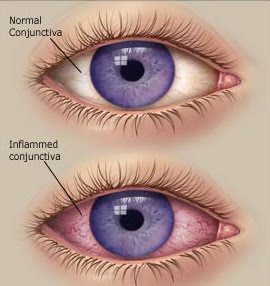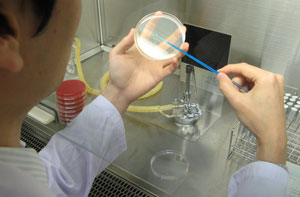Pneumonia is a condition caused by inflammation of lung tissue, making it difficult to breathe, and affects the body's ability to absorb oxygen. It can affect one or both lungs and is usually caused by infection. Pneumonia is more common in winter months and affects up to 11 of 1000 adults in the UK each year. Pneumonia is especially dangerous for children and infants, the elderly, smokers and people with existing health conditions, especially if their immune system is compromised. What is pneumonia? The most common cause of pneumonia is an infection. Many different types of infection can cause pneumonia, but the most common cause is a bacterial infection. In most cases the infection develops in the lungs, but infections in other parts of the body can lead to pneumonia if germs travel through the bloodstream to the lungs. The most common cause of pneumonia is an infection caused by bacteria form called pneumococcus, but other forms of bacteria, including Haemophilus influenzae, Staphylococcus aureus and mycoplasma pneumonia can lead to pneumonia as well. Viruses and fungi can also cause pneumonia, but it is much rarer, and viral pneumonia is more common in children than adults. Inhaling foreign objects can cause pneumonia, which is known as aspiration pneumonia is a rare form of the disease. Some people have a higher risk of developing pneumonia. These groups include children.
Children. Older people. Smokers. People who already have health conditions, including heart problems, asthma, cystic fibrosis and kidney and liver conditions. People who have weakened immune systems due to HIV or AIDS. Taking drugs that suppress the immune system. Reception for cancer treatment or recovery from illness. What are the symptoms of pneumonia? Symptoms of pneumonia vary and they can come on gradually over several days or very suddenly. In most cases, symptoms like chest infection. The most common symptom of pneumonia are coughing, which can be very dry and scratchy, while others develop a cough that causes sticky mucus and phlegm. Other common symptoms of pneumonia include:

difficulty breathing. Racing heartbeat. Usually poor health. Fever (high temperature). Chest pain. Loss of appetite. Coughing up blood (known as hemoptysis). Fatigue. Nausea. Disease. Joint and muscle pain. Shortness of breath. Feeling disoriented (this is more common in the elderly). As pneumonia diagnosed? Pneumonia can be difficult to diagnose because many symptoms are similar to other illnesses, including colds and infections breast. If you have some of the symptoms listed above, you should see your doctor who will ask about your symptoms and ask you questions about your medical history and your lifestyle. They will listen to you breathing with the stethoscope, and if they suspect that you may have pneumonia, they can check blood pressure and heart rate and take your temperature. If your doctor thinks that it is likely that you have pneumonia, they will advise you to have a chest x-ray. They can also take sputum and blood, to strattera price try to determine which infection is causing your symptoms. Treatment of pneumonia depends largely on the severity of the condition. Mild cases are usually treated very effectively with antibiotics that can be taken at home (if it cause pneumonia, bacterial infections). If symptoms do not improve after 2 days of antibiotics, you should see your doctor as bacteria may be resistant to the antibiotic or the infection may be viral, in which case antibiotics will be effective. If symptoms are severe, you already have lung disease such as cystic fibrosis or symptoms do not improve after taking antibiotics, intensive treatment may be necessary. Children and elderly people may be admitted to hospital because they have a higher risk of complications. Pneumonia may contribute to complications, including:
Deep vein thrombosis (DVT known as). Infected blood (such as sepsis, which can be life-threatening). Lung abscess. Pleurisy. What are the prospects for pneumonia? In many cases, pneumonia is a mild condition that can be treated very effectively with a course of antibiotics. However, if a person suffers from a health or they have a weakened immune system, the disease can be severe and potentially fatal. If you have symptoms associated with pneumonia, it is important that you contact your doctor, especially if symptoms do not improve or decrease. A healthy lifestyle can help reduce the risk of developing pneumonia. Avoid smoking and intravenous drug abuse and alcohol will reduce risk and healthy diet and exercise can help boost your immune system. People in high risk groups recommended to have vaccinations, including influenza and pneumococcal vaccination Jeb. Your clinic will contact you to advise you when you can do vaccinations. Rejecting tissues and covering your mouth when sneezing or coughing also help prevent the spread of germs. .



